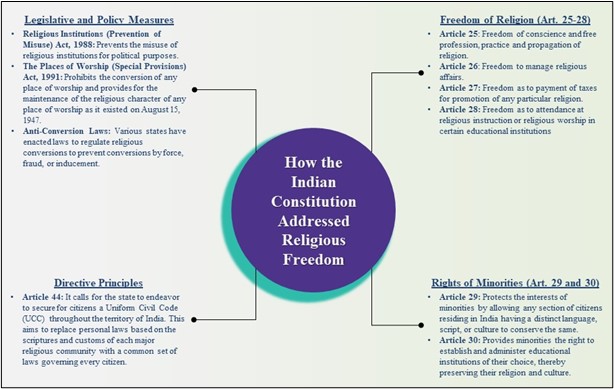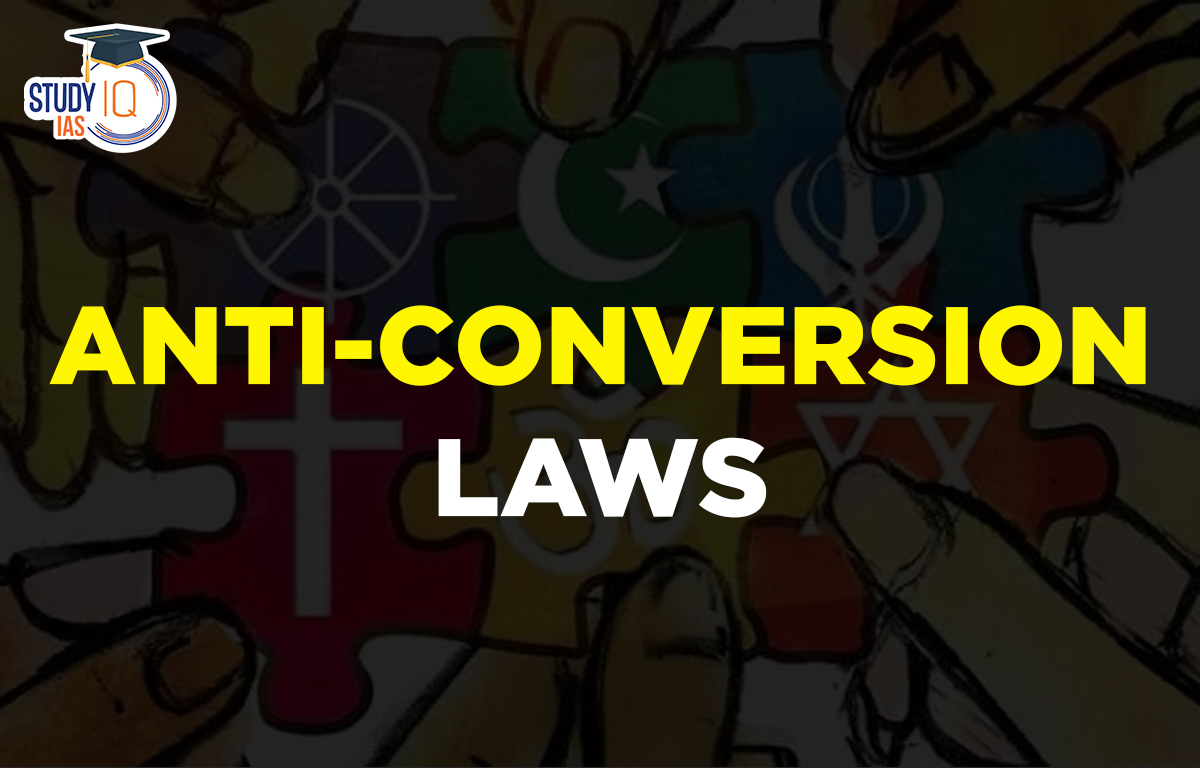Table of Contents
What are Anti Conversion Laws?
- Anti-conversion laws are legislative measures aimed at preventing or prohibiting religious conversions.
- The specific provisions and enforcement of anti-conversion laws differ across jurisdictions, and they may involve both criminal and civil penalties.

Anti-Conversion Laws in India
- Pre-Independence Era: Before Independence, several Hindu princely states such as Raigarh, Bikaner, Kota, Jodhpur, Surguja, Patna, Udaipur, and Kalahandi implemented anti-conversion laws to curb missionary activities spreading Christianity.
- Post-Independence Period:
- Parliamentary Bills: In 1954 and 1960, Parliament considered the Indian Conversion (Regulation and Registration) Bill and the Backward Communities (Religious Protection) Bill.
- Both aimed to stop conversions but were abandoned due to lack of support.
- No Central Law: Currently, there is no specific law framed by the central government specific to religious conversion.
- The Bharatiya Nyaya Sanhita (BNS), 2023, addresses offences related to religion under Chapter XVI.
- While it doesn’t specifically mention “forceful religious conversion,” it does cover various offences that could be related to religious sensitivities and actions.
- Parliamentary Bills: In 1954 and 1960, Parliament considered the Indian Conversion (Regulation and Registration) Bill and the Backward Communities (Religious Protection) Bill.
Anti-Conversion Laws in Various States
- Several states have enacted “Freedom of Religion” laws to restrict religious conversions carried out by force, fraud, or inducements.
- These laws are currently in force in 8 states: Odisha (1967), Madhya Pradesh (1968), Arunachal Pradesh (1978), Chhattisgarh (2000 and 2006), Gujarat (2003), Himachal Pradesh (2006 and 2019), Jharkhand (2017), and Uttarakhand (2018).
Examples of State Laws
- Orissa Freedom of Religion Act, 1967.
- Madhya Pradesh Dharma Swatantrya Adhiniyam, 1968.
- Chhattisgarh Religion Freedom (Amendment) Act, 2006.
- Jharkhand Freedom of Religion Act, 2017.
- Uttar Pradesh Prohibition of Unlawful Conversion of Religion Ordinance, 2020.
- Karnataka Protection of Right to Freedom of Religion Act, 2022.
- Haryana Prevention of Unlawful Conversion of Religion Act, 2022.
- Uttar Pradesh Prohibition of Unlawful Conversion of Religion (Amendment) Bill, 2024.
Need for Anti-Conversion Laws
- Protection of Cultural and Social Cohesion: Believed to be necessary to prevent conflicts and divisions within communities that may arise from religious conversions.
- Preservation of Traditions and Beliefs: The anti-conversion laws help protect the influence and power of a particular religion by preventing its erosion due to conversions.
- Prevention of Coercion and Deception: Essential to protect individuals from being forced or deceived into converting to another religion.
- Concern of Fraudulent Marriages: There have been cases where individuals were forced to convert after marrying someone from a different religion, raising concerns about deceitful practices.
Arguments Against Anti Conversion Law
- Violation of Religious Freedom: Critics argue that anti-conversion laws infringe upon the fundamental right to freedom of religion guaranteed by Article 25 of the Indian Constitution.
- These laws are seen as restricting an individual’s right to choose and practice a religion of their choice.
- Ambiguity and Misuse: The vague terminology used in these laws, such as “force,” “fraud,” and “allurement,” can be broadly interpreted, leading to potential misuse.
- This ambiguity has resulted in harassment and legal challenges against individuals, particularly from minority communities, even in the absence of concrete evidence.
- Encouragement of Vigilantism: The existence of anti-conversion laws has, at times, emboldened non-state actors to engage in vigilante violence against individuals accused of unlawful conversions.
- This has created a hostile environment for religious minorities and has led to incidents of violence and discrimination.
- Impact on Social Services: Religious organizations often provide essential social services, including education and healthcare.
- Anti-conversion laws can hinder these activities, as any aid provided by religious groups might be misconstrued as an inducement for conversion, thereby affecting the delivery of humanitarian assistance.
- Constitutional Challenges: There have been legal challenges to the constitutionality of anti-conversion laws.
- Eg., The Supreme Court of India has noted that certain aspects of these laws may violate the fundamental right to religion, indicating potential conflicts with constitutional provisions.
- Lack of Convictions: Despite the existence of these laws, there have been few arrests and even fewer convictions.
- This raises questions about their effectiveness and suggests that they may be used more as tools for harassment rather than for prosecuting genuine cases of forced conversions.
| Judicial Pronouncements on Conversion |
|


 List of Chief Ministers of Maharashtra F...
List of Chief Ministers of Maharashtra F...
 Electoral System in India 2026: SIR Upda...
Electoral System in India 2026: SIR Upda...
 SLAPP Suits: Meaning, Examples, Impact o...
SLAPP Suits: Meaning, Examples, Impact o...




















